#buddhist temple paintings
Text

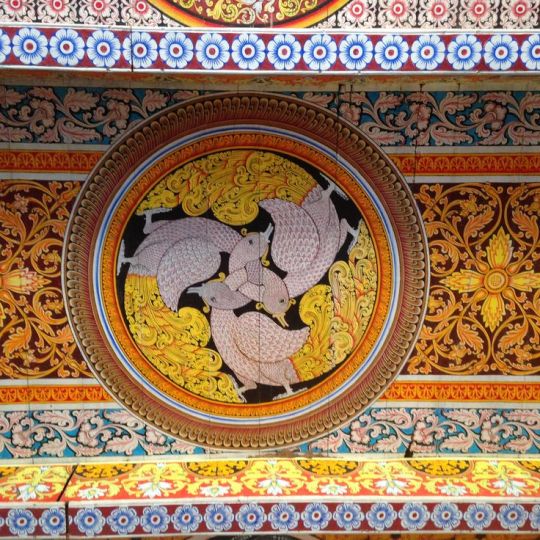






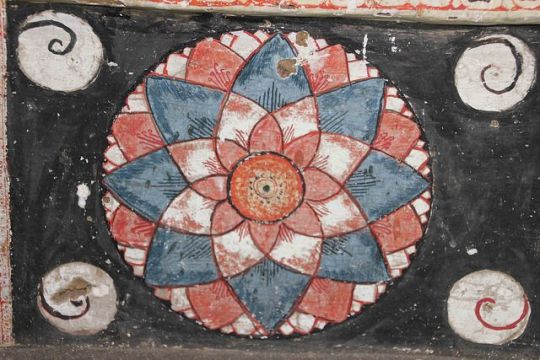

Ceiling paintings in Buddhist temples | Sri Lanka
61 notes
·
View notes
Photo
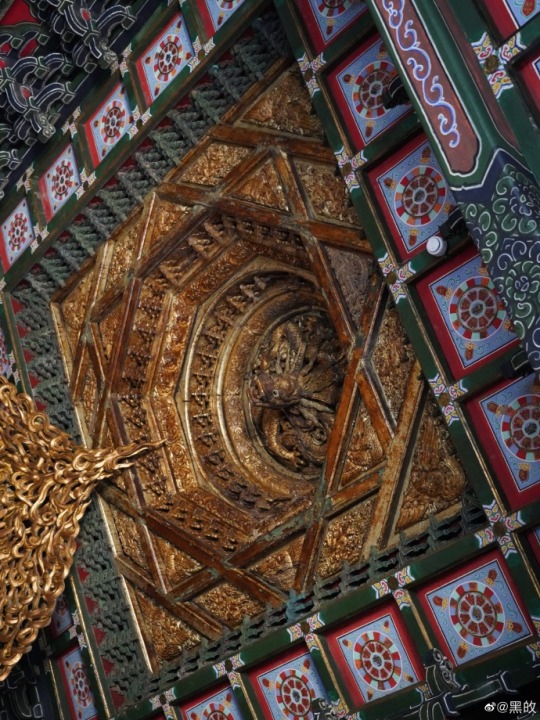
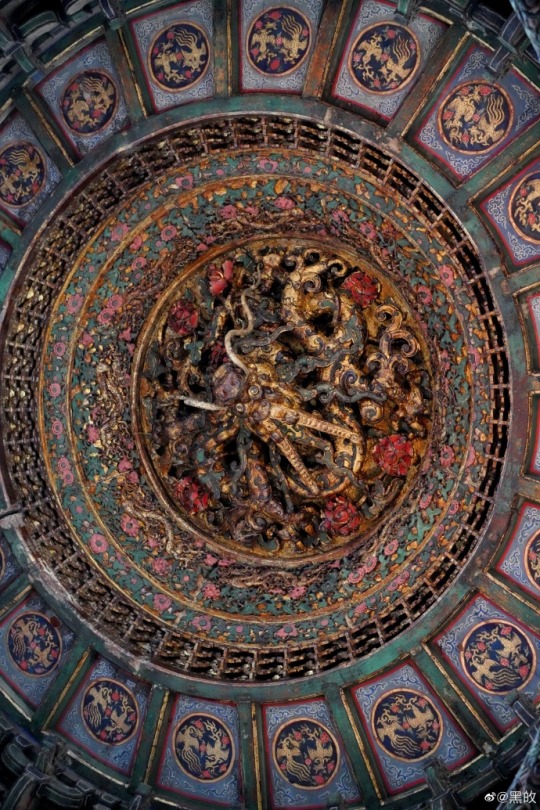


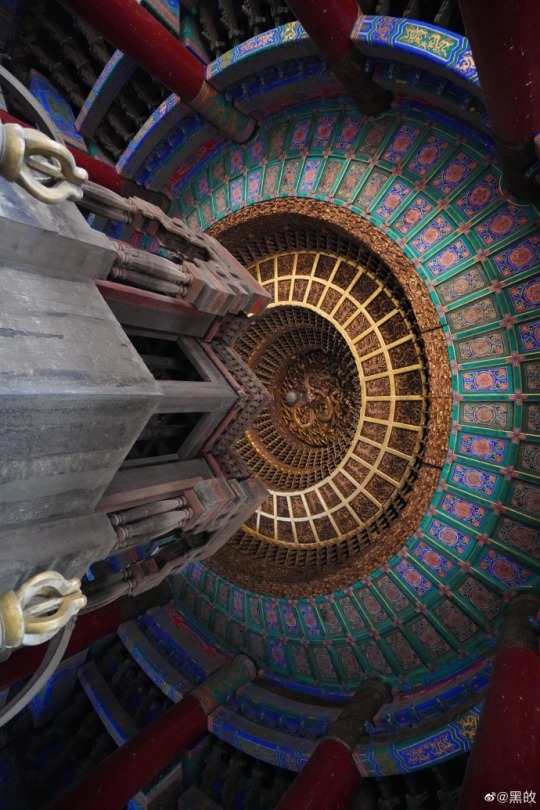
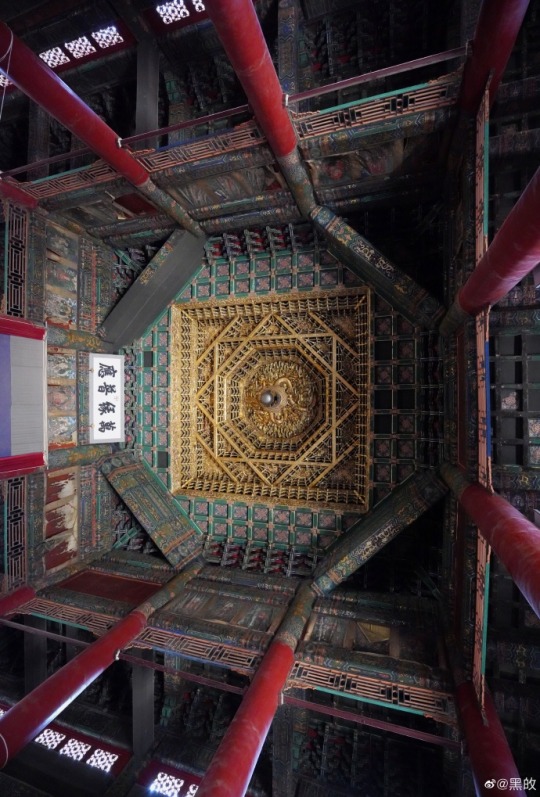
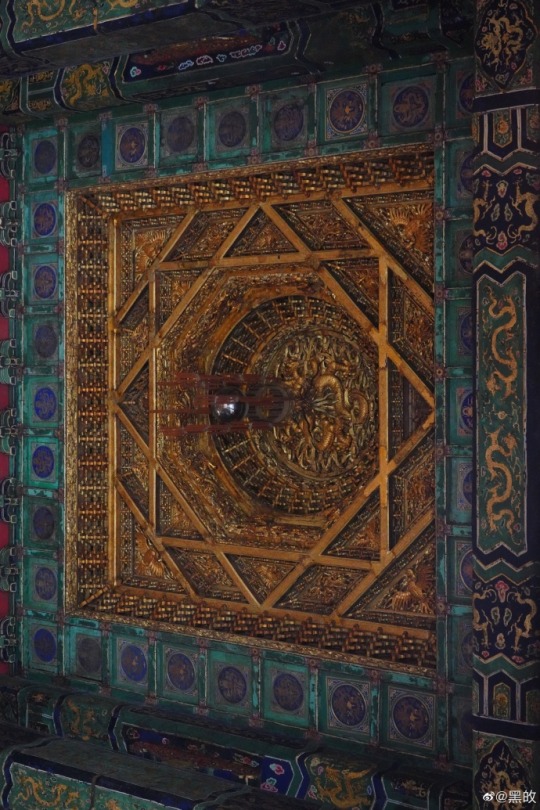



A few spectacular cosmological ceilings from various Chinese temples in Beijing and suburbs.
The dragon is a paradoxical emanation of the Supreme in Chinese traditional aesthetics, accumulated over millennia. Therefore, it is natural that in the temple microcosm, a zenith point is assigned to him.
Photo: ©黑敀
#ancient china#chinese culture#chinese architecture#ming dynasty#ming#qing dynasty#qing#wooden architecture#wooden buildings#old china#taoism#taoist#buddhism#buddhist#chinese folk religion#chinese temple#ceiling#painted ceiling#temple ceiling#religious art#temple architecture#dragon#dragon art
386 notes
·
View notes
Text




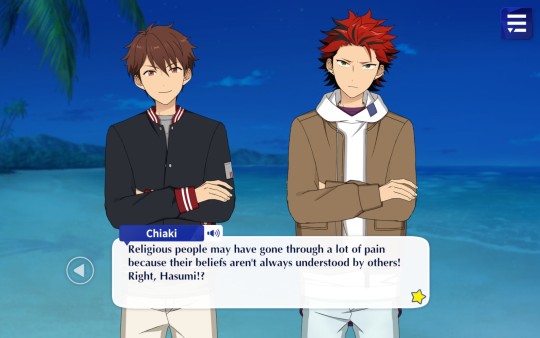
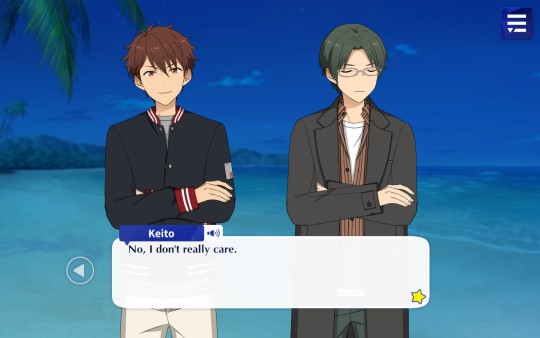




Theres so much going on here
#firstly keito is a comedic genius#secondly the way chiaki was trying to be cautious to not paint all religion in a bad light in front of keito. the buddhist temple son#but keito just. does not care#and then kanata. my lovely. its not even the first time he tortures souma. quarrelfes waterboarding scene you will always be famous
35 notes
·
View notes
Text
I went to the Buddhist temple on Mont-Pèlerin, in Swiss, for the second time, thinking I would spend an hour on meditation like last time. It is really quite inside and despite the amount of details and colours, it is a place that makes me feel peaceful.
Except that the day I went there were events I didn't know about because I didn't check to see if anything was going on. There was a conference in the morning, where a monk spoke in Chinese, I think, about achieving wholesomeness and teh importance of not doing anything unwholesome. What he said was translated in English in real time, but either the translation wasn't very good, or the teachings were a bit outdated or in anycase without relation to the world outside the temple. The monk gave an example about how regret can save you from having your bad deeds "ripen" saying if you do something illegal and get caught and show regret you may not be punished. I mean... Uh... Shouldn't you show regret by accepting your punishment for doing something wrong?... And should you show regret only of you get caught?

Anyway... After the conference and after all the monks and nuns and students went to eat, I stayed in the temple to paint. Some monks came back to prepare a table with food to share after the prayer at 2 pm. While they were preparing the table one of them started to talking to me and when he found out I'm Romanian, he started saying a lot of things that were ignorant, stereotyped and downright racist towards Romani people. He did seem to be aware of stuff when he spoke about the Holocaust, so he isn't as ignorant as he seems, but it also seems that he uses information to further his hate of people, specifically in the case of the Holocaust, of Jews. And than he started saying homofobic stuff, and kept saying "Sorry, it's just my opinion" and went on to say women should make babies and lesbians do not, so that is wrong. Some of the other monks were trying to get him to stop talking, but he kept saying "sorry, it's just my opinion".
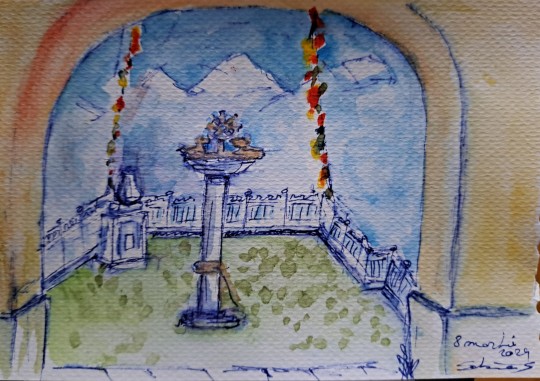
I am disappointed to find there are people like this practicing Buddhism. He wasn't even a student, but a monk. However, after searching more on the subject and discovering about the genocide conducted by Buddhists against the Rohingya population in Myanmar, I guess another illusion is gone. Which is nice, because the monk who held the conference in the morning said that we should let go of out delusions. 💁♀️
I get it that Buddhists have been persecuted for centuries in India, but that is not excuse for this kind of violence against other people. It's the same narrative the Israelis have...
#buddhism#buddhist temple#history#everything is political#painting#monks#racism#homophobia#genocide#swiss#travel
4 notes
·
View notes
Photo
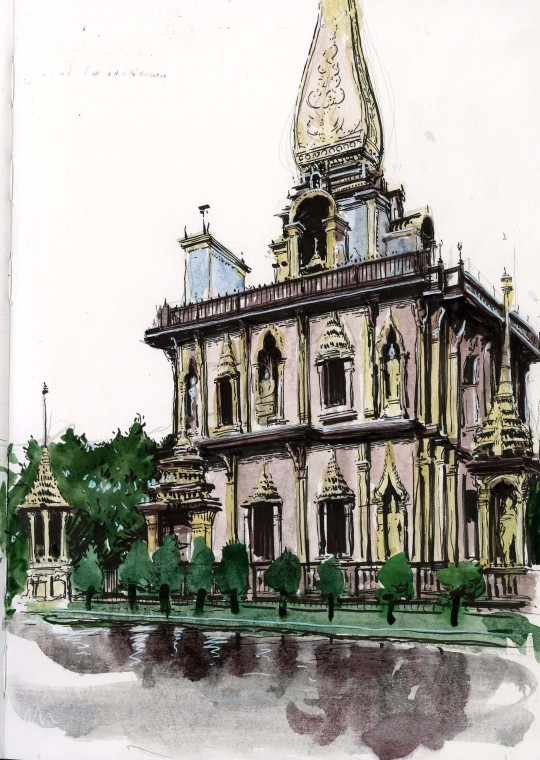
Thai Temple from my recent trip to thailand.
#art#artist#drawing#painting#ink#ink painting#water colour#illustration#illustrator#thomas elliott#thailan#temple#buddhaism#buddhist temple
49 notes
·
View notes
Photo
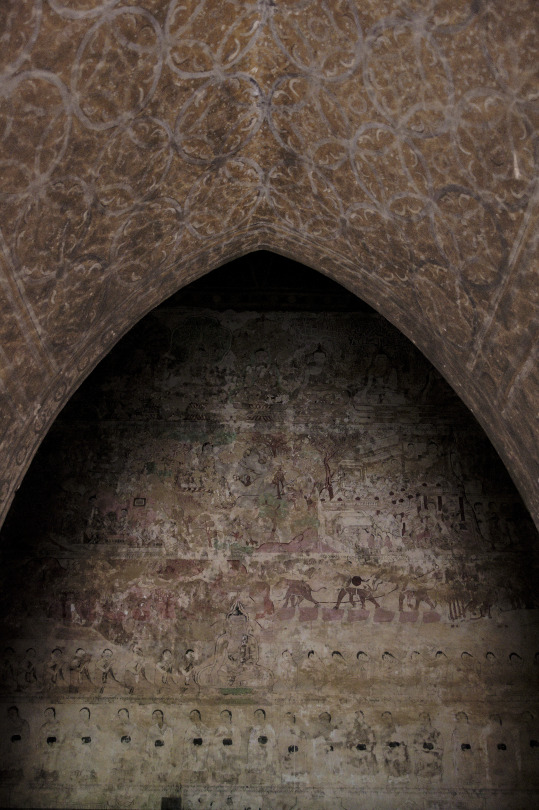
Sulamani Guphaya Temple, interior wall - Bagan, 2017
#picofthenight#travel#myanmar#original photographers#photographers on tumblr#ancient art#ancient architecture#painted wall#paintings#arcade#photoofthenight#buddhist temple
42 notes
·
View notes
Photo

June 2011 KTM Kathmandu Nepal Road to Lumbini
© KOJI ARAKI Art Works
Daily life and every small thing is the gate to the universe :)
#2011#June 2011#ktm#kathmandu#nepal#Road to Lumbini#Lumbini#2nd day in Lumbin#the 2nd day#photographers on tumblr#b&w photography#black and white photography#original photography#photography#koji araki art works#tibetan buddhism#buddhist painting#ceiling painting#dragon#tibetan buddhist temple#tibetan buddhist monastery#PENTAX K10#SIGMA 15mm 2.8 EX Fisheye#Fisheye#SIGMA#PENTAX
37 notes
·
View notes
Link
ニュースの0:54頃から紹介されている「菩提心曼荼羅」の制作に参加しました。雨に包まれた新緑の中での法要でした。この曼荼羅は5月14日まで五台山竹林寺本殿で公開されています。
0 notes
Text
Closet antisemites/racists love bringing up that the swastika is a Buddhist peace symbol (as if they give a shit about buddhism) like yeah it is but the skinhead white guy with a swastika tattoo isn't a Buddhist and the edgy teenagers who painted a swastika on a wall aren't Buddhists and you need to use the tiniest dash of critical thinking and common sense.
In a Buddhist temple its a peace symbol, scratched on some guys house its a hate symbol . And stop telling Jews they are being dramatic or chronically online for being upset/disturbed/scared or annoyed by swastikas!!
#jewish#jew#jews#orthodox judaism#reform judaism#jews and judaism#judaism#jumblr#judaica#antisemitism#antisemitic
7K notes
·
View notes
Photo

Flying fairy - Great Baoen Temple #Nanjing #南京 #大报恩寺 #greatbaoentemple #buddhist #temple #chineseculture #painting #buddha #meditation #buddhism #travelinchina #travelchina #travelblog #traveladdict #travellife #discoverchina #mychinagram #instachina #chinatravel #buddhastatue #buddhastatues (at Nanjing, China) https://www.instagram.com/p/CiJtCeSo8vB/?igshid=NGJjMDIxMWI=
#nanjing#南京#大报恩寺#greatbaoentemple#buddhist#temple#chineseculture#painting#buddha#meditation#buddhism#travelinchina#travelchina#travelblog#traveladdict#travellife#discoverchina#mychinagram#instachina#chinatravel#buddhastatue#buddhastatues
0 notes
Text
Well, I did say this was a multi-fandom blog... Alright, let's do this.
The Qing Jing Peak Lord's Bamboo House
(and the symbolism therein, as recorded in the donghua)
I was snooping through the establishing shots of the Qing Jing Peak Lord's Bamboo House, and had to laugh as I always do at all the gay symbolism that managed to sneak its way inside. But then I looked a little closer, and was floored by just how much passive storytelling was packed into background assets. I talked about it at length over discord, and at the urging of others decided to make a shareable post on social media as well.
First, the shots which first piqued my interest in this topic years ago:
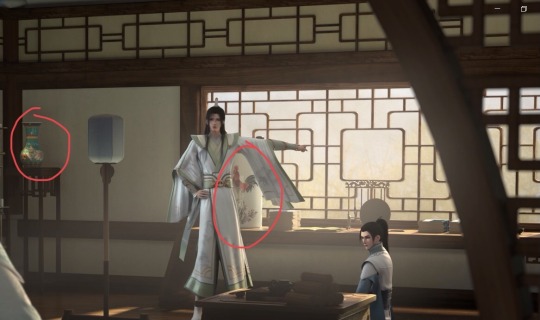
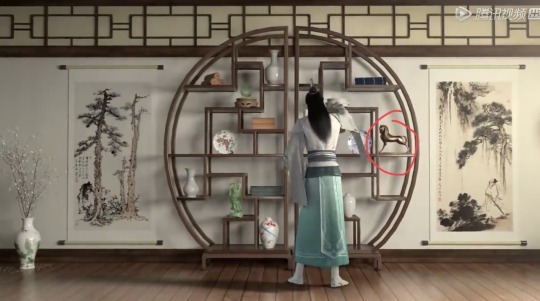
Shen Yuan transmigrates into the stallion-genre webnovel entitled 狂傲仙魔途 (translated as Proud Immortal Demon Way). The author's and his own usernames are dick jokes.
Notice the chrysanthemum vase, the cock vase, and the stallion statuette.
The stallion and cock are obvious nods to these jokes on their own, but for the uninitiated, the chrysanthemum is a symbol of gay sex between men, as the asshole itself is often euphemistically referred to as a chrysanthemum. This should have been Shen Yuan's first clue that not all is as it seems here! These are the personal quarters of Shen Jiu — the original Shen Qingqiu!
But let's move to the main room you first walk into upon entering the bamboo house.
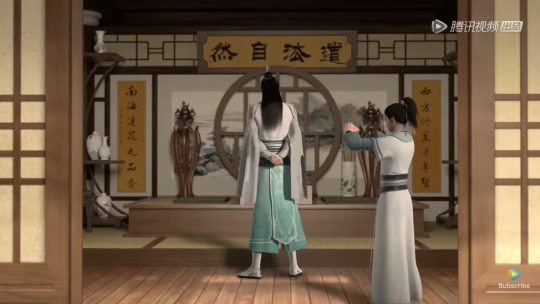
There it is: the writing on the wall.
As the Peak Lord of strategy and the scholarly arts, Shen Qingqiu would naturally have calligraphy and paintings hanging everywhere! So let's break it down.
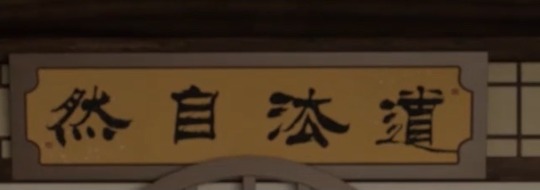
On the top we have 道㳒自然 ("Dao Follows Nature"), which comes from a Dao teaching by Laozi (founder of Daoism) meaning that life, death, the entire universe, the heavens and earth and everything outside and inbetween, all follow a set of laws referred to as the nature of things. Although unrelated to the Buddhist couplet below, it's certainly relevant!
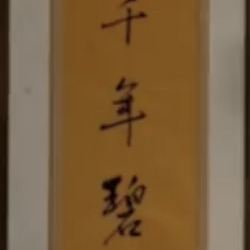
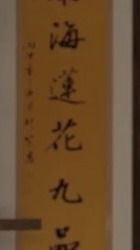
Originally hanging in right-to-left order, I've arranged them to read left to right here to make things easier to keep track of. The calligraphy reads 西方竹葉千年翠;南海蓮九品香 and is a couplet commonly found in Guanyin temples. My classical chinese is not as strong as I'd like, but this translates roughly to "The bamboo leaves in Paradise are green for a thousand years / The fragrance of lotus flowers in the South China Sea is as thick as 9 sticks of incense."
The character 西 for West is used to denote the destination of enlightenment/purity: the buddhist Paradise (think Journey to the West). The South China Sea is where Guanyin was born. Upon the Lotus flowers is where Guanyin is commonly depicted as sitting. The "9 sticks of incense" though literal can also refer to the 9 tiers/grades of reincarnation lotuses with the 9th tier being the lowest, meant for those who in life committed the most evil of crimes — the 4 parajikas — and who can only manage a sincere Amitabha recitation 10 times and no more than this.
To put this in context with Shen Jiu (the same jiu as in 9/九), the 4 parajikas committed by the 9th Tier Lotuses Reborn (officially entitled the Lowest of the Low) are:
Sexual Intercourse
Stealing
Murder
Claiming attainments of stages of pure mental concentration that have not been achieved (in other words, rushing or lying about your cultivation/enlightenment, or maybe even becoming a Peak Lord without having formed a golden core beforehand).
From what we know in the context of the novel, Shen Jiu is innocent of at least the first of this parajikas, but the overall view of Shen Jiu in the eyes of others in the story is that he is guilty of them all. This calligraphy can be seen as a condemnation or a reminder for the character Shen Jiu, who even as the Peak Lord Shen Qingqiu is widely thought of as a scum villain and the lowest of the low.
Phew! That's a lot to unpack.
But if you turn your gaze to the original screenshot, you'll see to the right that there's a vase painted with a blue bird. This vase appears in several rooms of the bamboo house, and seems to be the image of a qingniao (青鸟; lit: Qing bird, wherein 青 can mean blue/green/clear-but-brackish black).
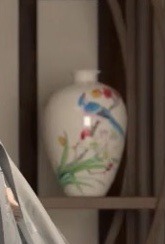
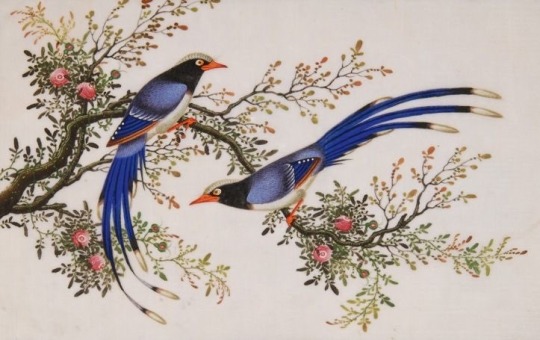
These qing-coloured birds are messengers and foragers of the Goddess-Mother of Paradise (Xiwang-mu 西王母, the "west/paradise" character from before, lit West-King(unisex)-Mother). They're a highly intelligent species who are exceptional in song (a good representative for Qing Jing's scholarly arts and pursuit of qin!), and the older ones might learn to speak human tongue. As a subspecies of luanniao (鸾鸟 lit: luan bird), they're thought to be related to The Phoenix and indeed thought to be the lifetime/samsara just before being reborn as a Phoenix.
If given to a "master" they don't like, the qingniao may refuse to pass messages or sing until they're set free, but if they do get along with you then they're loyal to the end.
As a point of interest, the Qing generation of Peak Lords uses the character 清, which is 青 ("colour of nature; brackish black, blue, green; young) + the radical for "water," resulting in the meaning of clear (as in water or heart; see-through); distinct; quiet (as in still); just and honest; pure; to settle or clear up; to clean up, expunge, or purge.
And as a bit of trivia, Liu Qingge's sword Cheng Luan 乘鸾 means "to ride the luan, take flight on the back of a luan." (Relevant, because the qingniao is considered a subspecies of luanniao).
With the Lords of both Qing Jing and Bai Zhan referencing this bird, I really wonder about its significance! It's spawning plenty of theories and headcanons for me.
Heading back outside for a moment, you'll find that in the Quiet Pool (清静小池 qingjing xiaochi (yes, the same Qing Jing the peak is named for)), there are lotuses, and on land there are flower shrubs which are either wide-petaled chrysanthemums (gay bottom jokes ahoy), or a type of peony, the king of flowers demarcating wealth and prosperity. Either way, a blossom fitting of our Qing Jing Peak Lord Shen Qingqiu!

My one regret is that I cannot get a clear shot of the fan hanging on the wall to try and translate the calligraphy on it. If anyone can snag one, please tag me! I also couldn't translate the paintings with poems hanging in Shen Qingqiu's bedroom (it's just too small and blurry for my bad eyes to make out). If I make another post attempting these things, I'll append them to this initial post in an edit afterwards.
#svsss#shen qingqiu#liu qingge#i started writing this at 3am#and now it's 8am#what am i doing with my life#who have i become#qing jing peak
498 notes
·
View notes
Text
Most people don't have any understanding of what has been lost in Lahaina Town. Not just lives and property, but an entire town.
Most people hear "a city/town in Hawaii" and they picture probably resorts. And there are plenty of resorts nearby. But those are all fine.
Lahaina was an old whaling town dating back to the original colonization by white settlers. Before white people arrived, it was the capital of the island, where the high chief ruled, including Kamehameha the Great. The buildings are old, wooden, and crowded together. Obviously that was a problem in the face of the insanely fast wildfire.
But these weren't mansions, Mc or otherwise. It was a tourist town, a destination for cute, spendy shopping and dining, full of art galleries. (OMG THE GALLERIES. There was so much ART lost. There was original Dr. Seuss art in one gallery when I was there in January. That's gone now. Etc.)
But the people who lived and worked in Lahaina were mostly working class, working retail and restaurant jobs, living in old apartments and small houses. Lots of elderly, lots of non-white in a wide range of ethnicities, old hippies who have been there since the 60s and 70s. Yeah they were probably a little better off than people who drive in from other places to work in West Maui, at least because their property was high value, if they owned. But they lived without A/C, hung their laundry on lines, biked to work, called in sick to go surfing when the waves were up. There was a Chinese cultural center and a Buddhist temple, two different structures, if that tells you anything. Multiple museums housing historic items and cultural centers.
And the town will be rebuilt, in some form, I imagine. Or re-developed, more likely. People who are now homeless, who can't afford to rebuild or pay for two residences while the recovery happens will be bought out by deep pocketed developers. If they rebuild Lahaina Town I'm afraid it will be Lahaina Town tm by Disney.
Another fake paradise for tourists with lava rock from the Big Island. Another bit of Hawaii swallowed by capitalism and climate change.
I'm not painting everything about Lahaina as it was as perfect. Front Street was an often gaudy display of brand names and hucksters out to shovel in the tourist dollars. And of course the politics of Hawaii are incredibly complex and fraught in so many ways. I'm just a mainlander haole. I will never live on the islands, despite my family there constantly asking me to move. But I've spent more time there than anywhere I haven't lived, almost all of that time in West Maui.
My mom works in a building that is not there anymore. She just described that job to me as "the last job she'll ever have" as she's 79 and very happy with working two days a week selling t-shirts to cruise ship people. My brother has worked in a gallery on front street for the last ten years.
I don't know. A city of almost 15,000 permanent residents is just gone. 50 or so are confirmed dead, in some horrific circumstances from what I hear.
My mom says people are just walking around with thousand-yard-stares, aimless, clutching cell phones trying to get signal (there isn't any, but you can get lucky and get a call through. Some texts are going in but not out.)
So I don't know folks. Keep those people in your thoughts. If you can donate, I think this may be a good place because it's going to lots of local orgs on the ground: https://www.hawaiicommunityfoundation.org/maui-strong
I keep thinking of new sad things.
Anyway I'm going to leave you with a picture I took while strolling down Front Street one evening.

584 notes
·
View notes
Photo
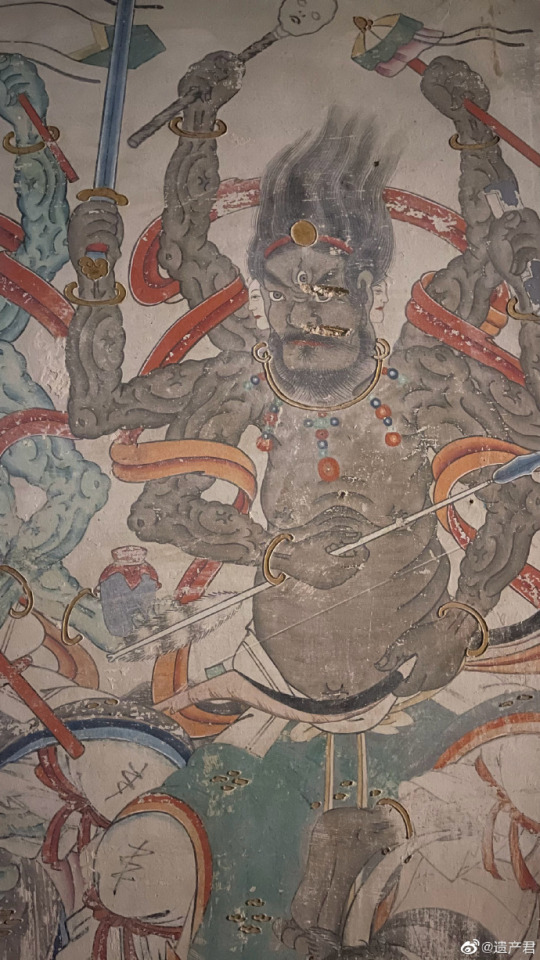


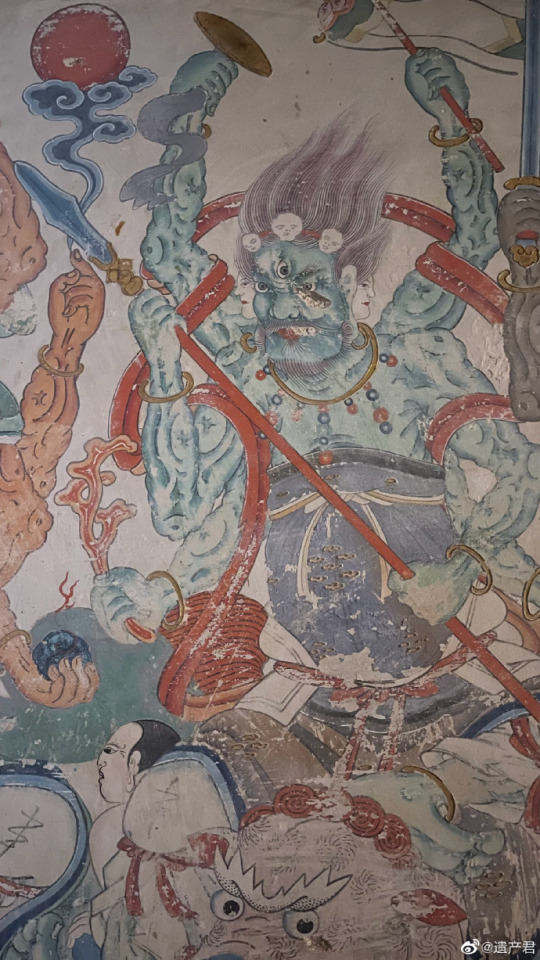
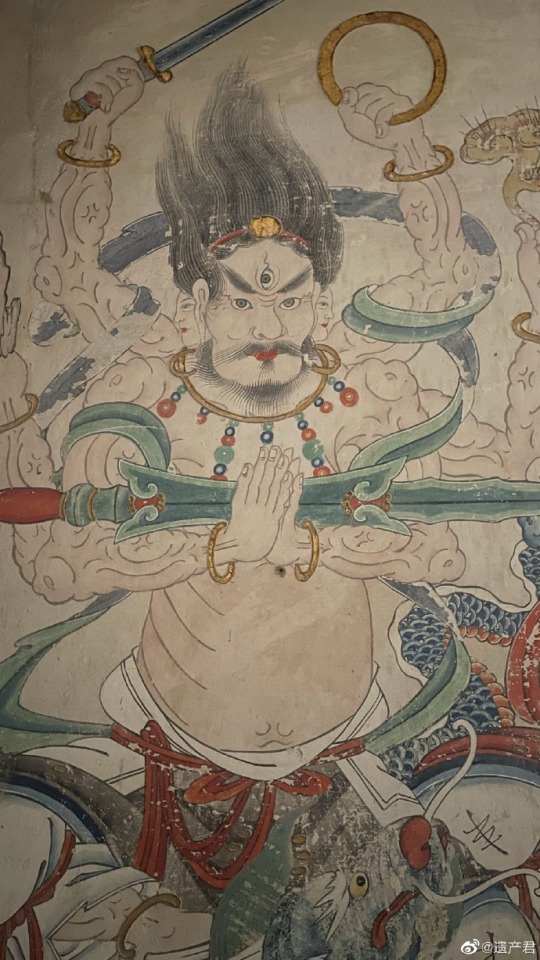
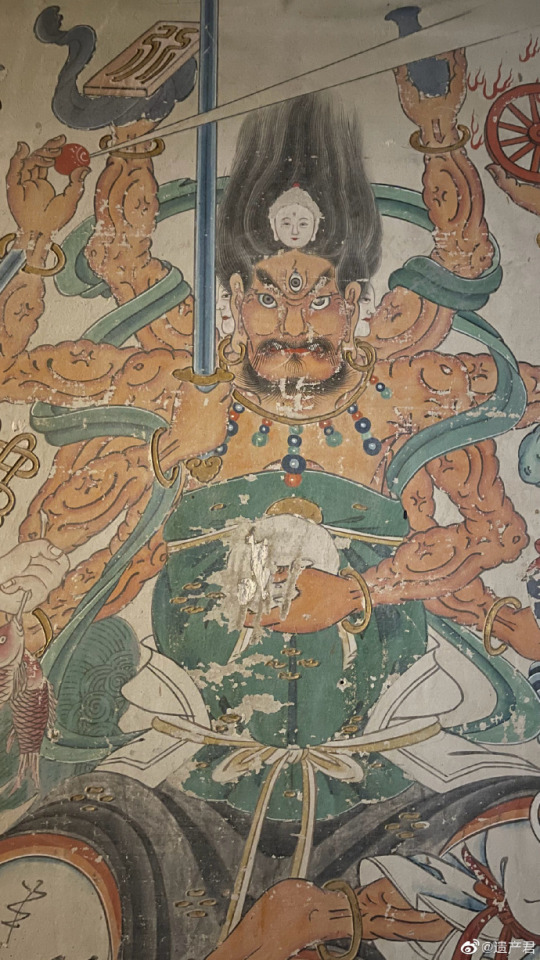
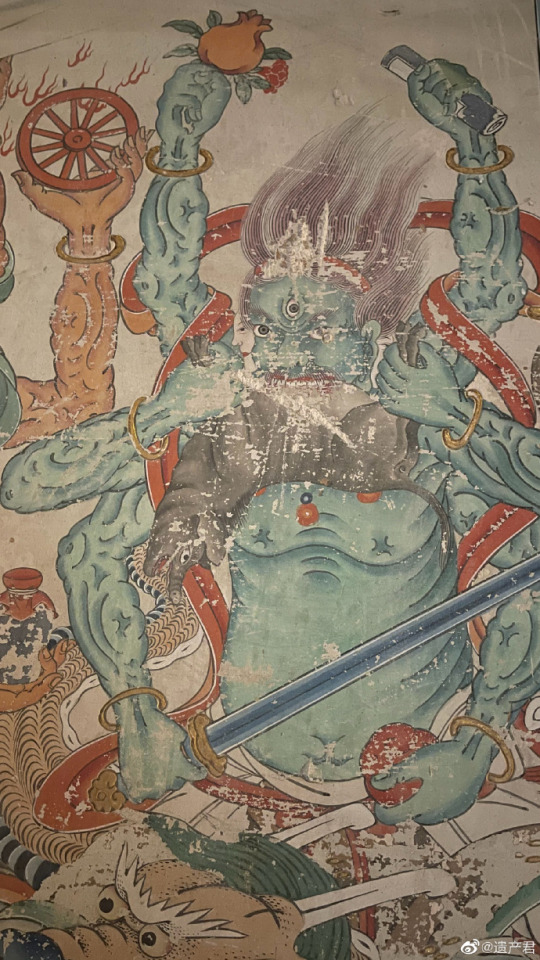
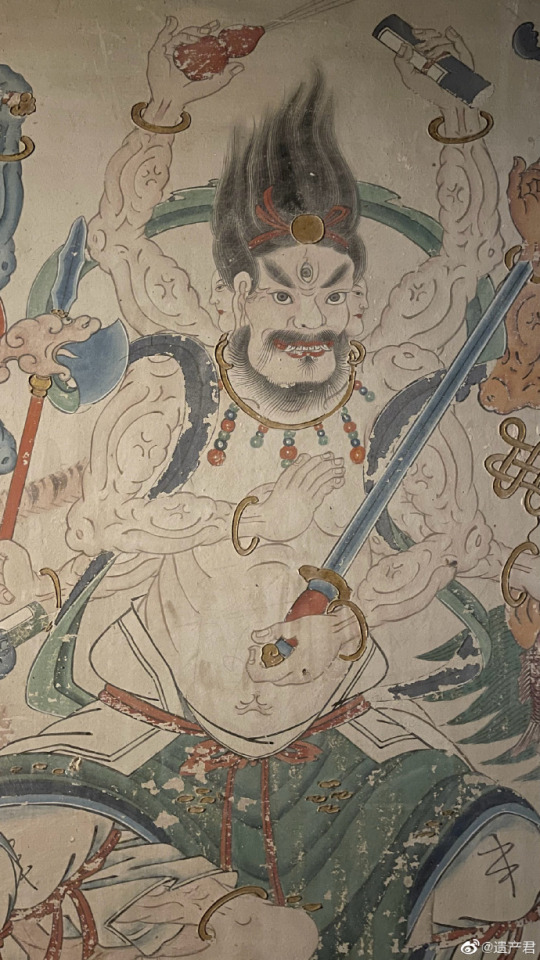

Qing Dynasty murals in Chongtai Temple (重泰寺), Yuxian, Hebei.
Photo: @遗产君
#ancient china#chinese culture#chinese art#chinese architecture#qing dynasty#qing#buddhism#buddhist#chinese folk religion#chinese temple#temple murals#religious art#temple architecture#mural#muralart#wall painting#buddhist deities#chinese mythology#buddhist temple#old china
64 notes
·
View notes
Text


‣‣ COR UNUM: CHAPTER FOUR | IZANAGI

‣‣ Synopsis: Our tale continues once again with blood that taints the water, and a name is revealed in the midst of battle. Who will win, the forgotten Shogun's daughter or one of the most powerful Samurai of Japan?

‣‣ Main Masterlist | AO3
‣‣ Pairing: Sukuna x Reader
‣‣ Word Count: est. 8k
‣‣ Warnings: Blank blogs & Minors DNI. Dead Dove: Do Not Eat. Cannibalism, set in the Early-Heian Period, trueform!Sukuna, graphic descriptions of dead bodies, descriptions of murder, gore, lots of death, era-typical violence & views, reader knows how to use weaponry.

It had been another week since you were allowed to live with the other women of the shrine. It had been going somewhat smoothly, despite the hiccups that occurred. You had found out the morning after your bath in the hot spring that you were to be assigned to cleaning.
It wasn’t unexpected, in fact, it was one of the jobs you knew you’d most likely be getting. It was a lowly job, even for a servant, and Sukuna must’ve found great joy in the idea of having you clean up the mess left behind.
However, you hadn’t banked on the idea of the cleaning being more than waxing the floors and sweeping away dust. You were subjected to cleaning Sukuna’s own personal shrine.
It wasn’t as grandiose as the one the Buddhists had once used in this very shrine, not nearly as golden but it was fearsome. It was a separate building on the temple grounds that he had occupied as his own, the floors were made of cold stone and the walls were tall. Within those tall walls, sat the centre of the shrine. It was a typical shinto shrine, but instead of honouring the Gods; it was honouring the demon that hunted women for fun.
It was surrounded by skulls and bones, some animal – like bull skulls, and some most definitely human. You didn’t need to wonder if they had been put there for decoration when you saw the abysmal state of the floor. You were thankful for the stone floor, blood was terribly hard to get out of wooden floors. It soaked it up like a sponge, but with stone, it simply sat atop as water would.
It took you four hours to clean the shrine on the first day, and the same the next few days until you were tasked with it today.
The stone floor was still coated in blood, but instead of finishing his meal, Sukuna had left the corpse where it was. Half-eaten, shredded skin and muscle sprawled across the floor and splattered against the paint of the Shinto shrine.
You stood motionless in the doorway into the shrine, the light that you had let in illuminates the face of the woman who had come to her untimely demise. You recognise her, she was one of the cooks of the complex. An older lady, perhaps in her thirties – definitely one of the oldest in the entire place, and she was kind to you. Maybe she had been a mother at some point with the way she mothered you with sneaky portions of extra rice.
It feels surreal to see her now spread thin across stone floors, it almost makes her not seem like a human anymore. Did Sukuna do this on purpose to torment you? Maybe he had seen the way she was more lenient with you, he couldn’t let you feel any ounce of joy here.
Your water bucket is heavy in your hand before you set it down on a clean patch by the door. With steps through the blood that splashed against your socked feet, soaking into the material until you felt it between your toes and under your nails, you crouch down towards the body.
Her eyes are open, and it’s like second nature for you to reach across and close her eyes to stop her from looking at you like that. Her skin is cold, no doubt having been here throughout the night whilst everyone slept. A quick survey of the surrounding area shows no scraps of her clothes, and the parts of her body that still remained somewhat intact were most definitely nude.
You don’t realise you’re staring at the body in front of you until her face morphs into your own, and it’s you who is laid out on the stone floor before the shrine with your body ripped asunder.
No. You couldn’t end up like this, you wouldn’t end up like this.
Moving the body itself was easier said than done, even with half of it presumably eaten. You’re not sure if it would be wise to remove her from the shrine, perhaps Sukuna had plans to return to his half-eaten cold meal later tonight so you set her aside.
Then you get to work on dragging your sponge through where she had been last laid. You never quite grasped the concept of just how compact the human body was, and all the organs within. Not until it was laid out before you in a messy pool of blood. You sweep shredded intestines and part of what you think might be the liver to the edge of the shrine where you had put the corpse.
You weren’t sure if Sukuna liked to eat those parts, you assumed he must if he never left anything behind most nights.
Once clear of the body parts, you return to the water bucket. You ignore the blood that coats your hands when you grab the sides of the bucket, and you have to ignore the rippled bloodied reflection of yourself when you catch a glimpse of it. It’s like second nature now for you to tip the water bucket over, the splash of cold water is loud in the otherwise silent part of the complex.
You watch as the water rolls towards you, down the natural slope of the building until it creates a small red river that flows down the steps and into the courtyard. At first, you had questioned why the shrine in the first place would be sloped in such a way until you realised it was for the ease of cleaning out blood.
“This is how you clean my shrine?” The voice is close behind you, and suddenly you can feel the pressuring presence that follows Sukuna around like a breeze. It sits heavy on your shoulders, grasps at your limbs until you’re stuck in place.
You hadn’t even heard him approach. Most predators didn’t alert their prey of their impending doom, instead opting to sneak closer and closer until it was too late for the prey to realise they had been caught. And Sukuna continues to loom over you, his large frame blocks out the light of the outside world and shrouds the shrine in an eerie darkness.
“You throw water at it and call it a day?”
You want to bite at him, snarl your own words and tell him that you hadn’t even finished yet — and it would’ve been done more efficiently if he hadn’t left his food lying around.
“No, Master Sukuna.” is the words you settle on biting out instead, and his response is to hum in an unconvinced tone.
“Then show me how you do it.”
He shoves you down onto your knees in front of him, the crack of your bones against the stone is muffled by his low laugh. He steps around you, ‘accidentally’ kicking your empty bucket away from you before he’s standing in front of his shrine — in front of you.
Your eyes are glued to the floor, evidence of the blood still present but not quite the bloodbath you had originally walked in on.
“I need to get fresh wa–”
“No. Use what you have.”
The cloth slides through the pink-tinted water, brushing it towards the natural slope of the stone floor. Sukuna is silent as he watches you agonise over the fact the small white cloth is not quite catching as much water anymore, and when you wring it out it only adds to the bloodied water that seems endless.
With each useless squeeze of the blood-sodden rag, you feel a slip of your resolve.
“Master Sukuna,” you address him, eyes not once leaving the bloody red cloth in your hands. He stays silent for a moment, you briefly wonder if perhaps he somehow left without you realising it.
“Speak.” He demands.
“May I go and fetch some more water?” You wait for a second, his silence is palpable. “Please.”
You can feel Sukuna’s eyes on you, inspecting the state of your clothes no doubt and the blood that taints your skin. It makes you want to squirm under his scrutiny, that unwanted feeling that bubbles in your stomach and up your throat until it threatens to spill itself onto the floor. His presence has always had an immense feel to it, and it’s oh-so suffocating.
“Fine.” You scramble to your feet, a quick bow of thanks thrown his way before you move as fast as you can to retrieve your tipped-over empty water bucket. You’re thankful for the fresh air when you step a foot outside of the shrine, and the lungful you gulp feels like your first breath in a very long time.
You’re one step down from the shrine when his voice calls for you again.
“If you touch my food again, I will make you eat it. Then, I will eat you.”
You don’t think he’s bluffing, he wouldn’t bluff. A demon like him would never lie about such a thing, he lives off of your fear and torment. He was telling the truth. So you nod your head once in understanding before you run as fast as you can away from the shrine.
The more distance you put between yourself and Sukuna, the more you feel like you can think clearly. No longer is his darkness creeping on the edges of your brain and your heart beats at a slower, more calm pace. His idle threat still lingers on your mind, the reminder of the heart you had been forced to consume still makes your stomach turn uncomfortably whenever you think of the texture.
It was one of the worst experiences you had ever gone through, and you can only imagine different parts of the human body would be worse.
You don’t realise you’re at the well that lingers at the edge of the complex until you’re stood over it, the bucket in your hand smeared in stains of blood from your dirty hands. You dunk it down into the well, the freezing cold water stings at the tips of your fingers.
It was oddly quiet for the time of day, you realise. When you take a look around, you realise there is no one in the courtyard tending to the flowers or airing the fresh linen. The next thing you realise is the large gate that otherwise encloses the complex is wide open, a winding path that’s covered in golden leaves leads down a hill to the unknown.
Your heart quickens. Your blood races with the realisation that you could leave. Right now. You could run, maybe even run into a village so that they could get you to safety. But were you faster than an apex predator who was designed for the thrill of the hunt? He had more arms than you, you don’t doubt he’d rip the village apart just to find you.
The bucket falters in your grasp for a moment, water spilling onto your sodden socks. The cold shock is enough to cause you to gasp, breaking your gaze away from the path that could lead to either your freedom or the demise of innocent people who don’t know what lives in the shrine nearby.
No. You wouldn’t have more innocent lives destroyed because of you. You had a plan; a goal. You were going to ensure that the monster that feasts on bones would not terrorise another village.
You feel a familiar burning gaze upon your skin, and when you turn to see who or what was staring at you – you’re met with nothing but the empty courtyard. But that feeling of being watched is still ever present, so you hurry back towards the shrine. The path to your presumed freedom dwindles away.
Sukuna thankfully isn’t in the shrine anymore, and neither is the body of the older lady you had moved earlier. There isn’t any new blood either, something that has you heaving a heavy sigh of relief. You do the same as you did before, but more strategically with a zig-zag pattern you draw with the water bucket to ensure you get it between the nooks and crannies of the stone tiles.
Once the shrine is returned to its previous state of cleanliness, the sky is dark and the stars have come out to play. The moon hangs over the sky, it’s late — that means it should be time for you to be allowed food. That alone has you hastily sliding the doors to the shrine closed, a silent prayer to whatever may be watching that tomorrow there’ll be no dead body for you to clean.
Dinner that night had gone by relatively quietly, there were no arguments among the women who all lived in the same room. There was an odd feeling in the air; like an impending doom of some sort. You couldn’t put your finger on it exactly, but there was definitely something that was causing a few of the younger newer servants of Sukuna to appear very antsy.
On the way back to the room that was your new bedroom, you were cut off by Uraume. They stood before you, hands tucked inside the sleeves of their kimono and an expectant raise of their eyebrow had you bowing at the waist to greet them.
“Master Sukuna has requested you to join him in his chambers tonight. You will bring him his sake.” Uraume is curt as always, not waiting for you to acknowledge or question why Sukuna wants you of all people to bring him his sake. They turn, leaving down the corridors of the large shrine until they vanish behind a shoji door.
You make the turn back towards the kitchen, finding the tray that you were to serve for Sukuna already set. It’s small, one small saucer-like cup and three flasks of what you assume to be sake. Years of practice with the sword has your arms firm enough to not shake the tray as you venture away from the safety of your bedroom and towards Sukuna’s.
It’s akin to the walk of shame, perhaps better suited to be named the walk of death. Maybe he’d grow hungry and gnaw on your bones tonight with a side of sake. Maybe he was still angry at you for touching his food without permission earlier today in the shrine.
Your thoughts cloud your mind until you’re standing before the large sliding doors that lead into Sukuna’s room. The artwork on the door is all hand painted, you can tell from the individual brush strokes and you briefly wonder who he may have gotten to do it. It’s a gruesome picture, bloody and violent, and there’s no doubt who is in the centre of the fire and chaos.
It’s a self-portrait, and that thought alone has you wanting to smash the delicate china on the tray against the door.
But instead, you lower down onto your knees and knock on the door. It’s silent for a moment, and then you hear it — a loud clap of hands.
The door slides open easily enough, and you slide in the tray first then yourself. You focus on the task at hand, closing the door and bowing as low as you can get to the floor. You can’t tell where Sukuna is in the room but you know he’s watching you, the hairs on the back of your neck stand at the attention of the predator that watches you so closely.
“Bring it here.” He demands, his voice low and yet still commanding. You raise from the bow, delicately taking hold of the tray before you rise back to your feet. Your footsteps are muted against the soft tatami floor, and finally, you take in the image before you.
Sukuna is sitting in a corner, surrounded by scrolls and literature. The table he’s using is low to the ground, and he’s perched upon a large Zabuton cushion. He’s leaning his lower right arm on the separate armrest, the upper arms are crossed over his bare chest and he’s not quite glaring at you as you approach.
He almost looks like he’s got too much on his mind to conjure up the effort to scowl at you.
You lower down into a kneeling position once in front of him, carefully sliding the tray towards him. You don’t wait for permission to pour him a drink, you’ve come to understand from the other women that he doesn’t like to ask for things — he prefers things to be done automatically, without thought.
The sake sits in the small saucer, waiting for him to pluck it from the tray and drink it in one go. But he doesn’t move yet, and you take the chance to glance up at his face. He’s not even looking at you now, only two of his eyes are open whilst the bottom set rests as if they were closed for sleep. He’s scouring over the scrolls on the table, the brush he was using to write his own letters sits waiting in a pot of ink.
“Master Sukuna,” and he hums in response quite quickly to you, “May I ask you a question?”
One of the lower set of eyes opens just enough to glance at you, and he huffs out a sigh that’s quite unbefitting of the monster you know him as.
“One question.”
Well. That certainly makes you want to second guess the question you wanted to ask, your lips twist a little in thought and Sukuna seems to be put off by the wait for your question. His head turns towards you, and that scowl he often sends your way is making itself present.
“What’s plaguing your mind?” You ask, and you bitterly regret it when he frowns so much that you think it may be the last thing you see before your head is removed from your shoulders.
Instead of answering, he leans forward to swipe the saucer with the sake in and swallows it in one gulp. The small saucer that looked like it would still fill your palm was far too small in his, his index and thumb were delicately holding it — it was odd, to see a creature of such mass destruction holding the fine china with care.
He places it down, and you move to automatically refill it. This repeats four more times before he settles into his position once again, the arms crossed over his chest reaching over to the table to pluck a scroll from the collection he had opened.
He flicks it towards you, the paper bounces off of your chest and into your hands when you fumble to catch it. You look down, reading over the painted black letters.
The Shogun moves north. The Shogun’s army is in search of a four-armed beast, said to eat the souls of women and children. The demon is rumoured to be residing in an old Buddhist temple. Kill him and everyone there.
It’s not signed by anyone, a simple mark in the corner shows it was approved by the Shogun. You weren’t sure who gained the title after the passing of your father, but you knew the number of Samurai that were within the Shogun’s army. That number was excessive to deploy on a singular temple… they must know who Sukuna was and exactly what he was capable of.
The words trouble you, however. They wanted to kill both Sukuna and whoever else was within the temple. Did they think you were all sympathisers? Followers of Sukuna? They didn’t know that all of you were plucked from your homes after he slaughtered your families.
Your hip feels awfully empty without the weight of your sword, you had no defence if they were to strike at some point. Could it be soon? You have no idea how old this letter was—
“The gate.” You mumble. The unease that fills your stomach is suffocating, your heart thunders against your chest more and more with each passing second. The gate. Someone had opened it to the outside world.
“What?” Sukuna rips the scroll from your hand, eyes scouring to see what he may have missed to make you say that. “What gate?”
“The gate on the east side of the temple. It was left open.”
You meet his gaze once you glance up from the sake set before you, and for the first time, you see a new emotion on Sukuna’s face. He looks concerned. His eyebrows are pressed together in thought, all four eyes are wide and alert. He didn’t know about the gate.
“They’re already here.” He summarises, sharpened claws shredding through the scroll. The air around him intensifies, the suffocation of such a dark presence causes you to recoil away from him when he starts to stand. “They’re already in my fucking shrine.”
“I’ll kill them all.” He marches past you, ripping open the shoji door with such ferocity that it’s ripped from its sliding mechanic and left awkwardly hanging. “Stay here. Do not move.”
You’re left to watch his figure disappear further down the corridor until he turns a corner and he’s gone. It’s awfully quiet, and that same antsy air that had settled upon the women at dinnertime is back once again. Something feels off. How did the Shogun know the exact location of the shrine? As far as you were aware, Sukuna had gone to great lengths to secure this place as his own sanctuary.
There’s a clatter in the distance that sounds like a door being broken through, and then suddenly there’s an uproar of voices. A lot of voices. Not women, but men. The Shogun’s army was here. Immediately you’re up from your kneeling position, and you turn on your heels to survey the room.
Your weapon must be here. It must still be here, he had brought it with you – so surely he must’ve kept it close to him, somewhere you could never get it back and use it against him. But each turn of your head reveals that his room is empty of any sheathed sword until you turn towards his futon.
Above the bed is a long-handled spear, a Naginata. It’s three-pronged, something so rare and odd that you’re not sure if it would even be good to use in battle. However, a weapon is a weapon and you move across the room. Climbing across the platform that houses Sukuna’s futon to swipe it off of the rack it was on.
It’s heavy in your hands, as your fingers slide along the black hilt towards the end of it – it’s got a hoop, as if it could be connected to a chain of some sort. What kind of person would use this when it was attached to a chain? The arm length you’d need— Oh. This was Sukuna’s personal weapon.
“What do we have here?” An unfamiliar voice speaks from behind you, and you spin fast enough on instinct to slam the blunt end of the hilt into his temple…
…But it never connects. In fact, it hovers just a few inches from his face and you stare in horror at the fact you’re frozen in place. Whatever you’re hitting feels like a brick wall, but you can’t see what you’re hitting.
“Foolish woman. Swinging around a weapon that’s not befitting of your station.” The unknown Samurai tuts, lifting his head enough to reveal his face from beneath the Jingasa hat he wore.
You’re met with the brightest blue eyes you have ever seen. White lashes frame them, and that feeling from before returns — something is terribly wrong here. You had to get away from this man, away from whatever invisible barrier was surrounding him.
He doesn’t try to grab you when you back away, pulling free the weapon from its invisible prison and spinning it in your hand until it’s lined with your body. The blue-eyed Samurai tilts his head at the stance, an eyebrow-raising – he recognises that type of stance. Of course, he would.
“Who trained you?” He asks.
“My father.” And the man in response hums in response, his lips set into a thin line.
“Tell me your clan name.”
Your lips move to form the name of your late husband but your tongue stops, the word dies and instead, your family name rolls off your tongue.
“Zen’in.”
Most people would perhaps laugh at the futile attempt to use a former Shogun’s name as a way to worm their way out of a situation, but instead, the blue-eyed Samurai just tilts his head for a moment and flits his gaze over you. But it’s different from when people have looked at you; he’s looking through you, into you.
“So you’re the Shogun’s niece.” He huffs out something that sounds like a scoff, disbelieving that he’d stumble across you of all people in a place like this.
Niece. Your uncle was the new Shogun, having been passed on by your father to him no doubt. You had no brothers, you were never to inherit the title – a woman had no place with the title Shogun.
“A shame. I’m sure your Uncle would’ve loved to know you were still alive, but he’s very certain you had died alongside your husband a few weeks ago.”
“Who are you? My father had never mentioned a Samurai who could stop attacks with… with sorcery.”
“Sugawara Michizane.” He offers his name, a slight up-tick of the corner of his mouth as he finds amusement in your confusion. You don’t recognise his name.
And then, in the midst of your thoughts, the Samurai moves fast, maybe faster than Sukuna had when he first attacked you. He’s across the room in a blink of an eye, there’s the click of a katana being unsheathed. You react out of instinct, the hilt of the spear you hold clangs with the metal of the sword and the Samurai doesn’t relent.
He brings his sword back and attempts a strike on your opposite side, your fingers tighten around the spear – you’re not going to make it, he’s going to hit you. But there’s another clang of metal hitting your spear, and you find that you had moved the spear to meet the blow.
Blue eyes widen at what he witnessed before they narrow at you. “So you inherited your father’s technique.”
Technique? You had inherited his swordsmanship, yes, but his technique with a sword was far superior to your own. He moved faster than any man you had seen, he wiped the floor with his opponents when they said he was too busy with politics to be a real Samurai.
You’re pulled from your thoughts when the Samurai backs away from you, his katana sits sheathed once again and this time he raises his hands at you. His arm is outstretched in your direction, an odd glow illuminating the contours of his face in a blueish light that seems to be forming around his hand.
The hairs on the back of your neck and arms stand on end, the feeling that came from his hands was something similar to Sukuna’s. It was a powerful energy. So you move. You move faster than you ever have before in your life, it’s as if time itself slows down to allow you to sprint across the room with your spear brandished.
The eyes of the man follow your movements, but his body is too slow. You lower down onto one knee once you approach, below the outstretched hand that has a slow-growing orb of blue energy starting to form at the very tips of his fingers. And you strike with the tip of your Naginata upwards into his chest.
It passes by the barrier surrounding him, a buzzing sound that hisses at the foreign entity that passes by and then you feel the familiar wall of what it’s like to strike a body. The spear makes quick work of cutting its way through muscle and organs alike, lodging itself into its resting place next to his spine.
The world seems to spin back to the correct time, and the blue light that had been aimed at you fires regardless of having no target. It comes with a loud bang, the sound of walls being shattered and dragged along with whatever had come from the Samurai who’s staring down at you in disbelief.
His blood curls around the three prongs of the spear, around the handle until it sullies your hands.
“How?” He splutters, blood staining his teeth and filling the cracks of his lips as he glowers down at you. “You shouldn’t—... Nothing can…”
His hand raises once again, and this time instead of the blue glow, it’s a vibrant red that nearly blinds you with how bright it is in front of your face. This one feels much more different to the blue energy that vibrated around his hands, this one feels more destructive and more violent.
You square your shoulders and push all of your strength into your arms and legs as you grab ahold of the spear before running it upwards through the man's body. The red glow falters until it dims completely, the spear rips free of his shoulder with a vicious spray of blood that coats your once pristine white kimono.
He crumbles to his knees, hands uselessly turned upwards in his lap and his head tilts back to stare up at you. His once vibrant blue eyes seem dull now, blinking sluggishly up at you.
“You’re a disgrace to your family…” He mutters, words wet with the blood on his tongue and yet he manages to say them loud enough that they strike deeply at your already wounded heart. “A Curse User's whore.”
You want to ask him what he means by that, ask him what a curse user even is but there’s the sound of fighting in the distance. You glance down at the Samurai, his head now dropped downwards until his chin presses into his chest. He no longer moves, his heart ceasing its sluggish attempts of keeping him alive.
You had killed one of the Shogun’s samurai. You were a traitor.
The sound of fighting grows louder, yells of Samurai as they get no doubt ripped to shreds by clawed hands. You leave the body of the samurai known as Sugawara in his final resting place and dart down the corridor towards the room that should have all the women inside still – hopefully, they had kept together, huddled for safety.
Yet when you rip the door open, you’re met with the kind of silence that accompanies death. In each of the beds, there is a body. Faces of women you had gotten to know and even shared food with, the young faces of women who had washed your hair and in turn, you had washed theirs, all of them are lax.
You would’ve assumed them to be asleep if it wasn’t for the growing pool of blood that seeped into the wooden floors, into the cracks. Each of their necks was slit. All at the same time. This wasn’t Sukuna’s doing, he would’ve shredded them no doubt. This was organised, most likely by Shinobi that had slipped in through the shadows and slid a knife across each of their throats so they didn’t awaken.
You could’ve been one of them, you realise. If you hadn’t been summoned to Sukuna’s chambers by him. You could be dead and by the hands of the army that had once served your father; and in turn, served you.
Men are monsters. Monsters are men.
You have to find Sukuna. Why? Perhaps to kill him, none of this would’ve happened if he didn’t exist. You couldn’t undo the past but you could right the future—even if you were classed as a traitor, maybe it’d be for nothing in the end. The Naginata no longer weighs anything in your hand, as you let it roll in your hand until its hilt is positioned between your bicep and ribcage for safekeeping.
The halls are easier to navigate once you narrow down the sounds of the fighting, it leads you to the entrance where you had seen the open gate just earlier that day. The doors had been ripped off, and immediately you’re hit with the smell of tangy copper that sticks to the roof of your mouth.
It’s a battlefield, swords are snapped and buried into the ground where they had fallen from the hands of the Samurai who had dared to approach Sukuna. And the monster himself is closer to the gate, a large figure doused in blood as he swipes at thin air to only have men a few feet away splinter into three parts as if he had used his claws directly on their skin.
You can only stand and watch, in both horror and amazement to see him in his element. He clearly was designed for such chaos, he strived off of it. His muscles moved perfectly with each move he made, each of them calculated and precise. He didn’t quite move like a monster would; a monster was often frantic in its attacks. Instead, Sukuna moves with a sense of regality, an air of superiority and you can only think of one thing.
He looked like a King at war.
There’s a movement on the sidelines of the ongoing fight, and you spot one of the Shogun’s shinobi climbing up into the shadows of the night atop the roof. Sukuna doesn’t see him. His eyes laser-focused on all the Samurai who come at him head-on, he’s going to be caught off-guard. He’s going to be taken down by a ninja belonging to the same army that had slaughtered innocent women.
You glance at the ground quickly, spotting a long bow that had been dropped by an archer who had thought it would be wise to attack from afar — that clearly didn’t work out. You swipe it up, the Naginata being placed on the floor next to your feet.
There had been times when you were trained with a bow as a child, something your father had actually said yes to when you were younger. Often it was just for hunting, a hobby that you had partaken in quite often to catch game for your husband. Your form is no different this time as you aim your arrow at a man, you suck in a harsh breath and hold your form steady.
The ninja from above exclaims something as he leaps from the roof, and Sukuna spins around last second to see where the noise is coming from but instead, his eyes settle on you. His gaze is burning through you, no doubt cursing you for even stepping foot out of his chambers and disobeying his order.
But he remains in place, watching as you release the breath you were holding and the arrow soars through the air like a knife through butter. The ninja is hit directly, a clean arrow through the throat, falling to the ground with a loud crunch of bones against a stone path.
You can feel that same burning gaze as you pull another arrow from the fallen archer's quiver, nocking and drawing it to release it into one of the Samurai who raised a sword to Sukuna’s blindside. You don’t dare meet Sukuna’s eyes, you’re unsure if you’ll like what you see as you continue to prove yourself a traitor to your own country and kill those who served the Shogun; your uncle.
Eventually, that burning crimson gaze is ripped away from you, and you lower your bow to find that you had killed the remaining Samurai in the courtyard. But you’re unable to relax or find solace in that they were dead. There’s the distant sound of marching footfall, another wave of Samurai no doubt coming.
This time you watch as Sukuna flexes two of his hands in front of him, an orange glow starting to form between his fingers before he then draws his arms up, a direct mimicry of your own stance when you had drawn a bow. He releases the fire arrow, and it soars through the night sky like a shooting star until it plants itself into one of the leading Samurai.
And from there, it explodes into a larger flame that bounces from man to man until they’re a distant flame filled with anguished screams and the slowly approaching smell of cooked flesh. Sukuna stands there silently, watching the scene from afar and you can see the tension loosen in his shoulders for just a moment. But then he turns abruptly towards you, a feral snarl resting on his face when he meets your gaze.
A hand grasps at your jaw, squeezing so tightly that you can feel your bone pop uncomfortably. Sukuna glares down at you, his own face is covered in blood similar to your own.
“Did you know this would happen?” He growls, claws starting to pierce through the flesh of your cheeks. “Did you know that we had a spy living here?!”
A spy? Did he mean one of the girls? Surely not… How… How would that work? Sukuna shakes you from your thoughts, a loud growl ripping through his throat. “Answer ME.”
“No!” You yell back, a hand coming up to grab at his wrist uselessly in hopes of peeling him away from your face. “I swear to you I didn’t know! I only knew the gate had been left open when I was cleaning your shrine!”
Sukuna is quiet for a long moment, or it feels like a long moment but perhaps no longer than a few seconds pass by before he releases your face.
“One of those whores escaped, a signal for the Shogun to make his move.” He reveals, running a bloodied hand through his already blood-soaked hair until it’s slicked back. His chest is heaving with the effort he had put into slaughtering men as if they were nothing but sheep.
“Pick that up.” He points with one of his lower hands at the Naginata, and you quickly bend down to grab it. You figure he may want it back, and when you go to offer it to him he instead grabs at your bicep and you’re pulled along behind him.
It’s hard to keep up the pace behind such a gigantic man, his single footsteps were about five of your own. Your socked feet drag along stone uncomfortably, cutting into the heel when you try to push off of your feet to keep up.
Sukuna doesn’t speak again as he drags you away from the shrine through one of the back gates and into the forest. The stench of death and burning wood grows fainter and fainter with each scrape of your now-bloodied feet through the undergrowth of the forest. Sukuna doesn’t seem to care that you’re hissing in pain with each stumble over hidden rocks and sharp prick of nettles.
You have no idea where he’s dragging you, or why he was even dragging you away from the shrine in the first place? Surely it’d be easier for him to kill you, or even just leave you there to be discovered by the Shogun. Who knows what the Shogun would have in store for you if you were found alive amongst the slaughtered.
You’re abruptly stopped, however, much to the relief of your feet that still sting when you put weight onto them. You look up at Sukuna to see him wordlessly staring ahead, and so you follow his gaze. You’re at the foot of a farmer's field.
It looks like a regular field, more of a pasture of sorts for animals. And you seem to be right when Sukuna’s head quickly lifts and shifts his gaze to movement in the farther end of the field — horses.
“Wait,” you tug back on his wrist when he starts to move again and you’re surprised to see him turn his eyes back down to you, though he looks very displeased at the order to stop. “You can’t just steal a farmer’s horse.”
Sukuna stares blankly at you, lips that were turned downwards are now a flat line and you can see it’s taking every ounce of his dwindling self-control to not shout at you.
“Murderers don’t get a say.” He shoves the words at you instead, and you’re back to stumbling behind him. You suppose he does have a point, a very good one. You were by all definitions of the word; a murderer, a traitor. You had killed not just one but a dozen Samurai… and in turn, saved Sukuna’s life.
It wasn’t something you planned on doing, in fact, you’d argue you only retaliated because of what they did to the innocent women you lived with and Sukuna surviving was just an unfortunate consequence. Or at least that’s what you tell yourself.
You couldn’t have possibly done all that for Sukuna. You wouldn’t. He was a monster, nothing more and nothing less. He feasted on human bones and forced you to eat your own late husband's heart. He wasn’t worthy of saving…
And yet.
“Stay here.” He orders, before turning back to you with a long finger pointed at your face. “And I mean it this time. Do not move or I’ll have your fingers for breakfast.”
This time you don’t move from your spot, awkwardly moving from foot to foot to relieve the pain as you watch Sukuna slink off into the darkness of the field. You wonder if a horse would even trust him. When you had worked with the horses for the army they had all been temperamental around people with less than good intentions.
They often loved you and hated the men who’d ride them into battle. You can’t imagine a horse's reaction to a four-armed, two-faced, bloody monster approaching. They probably would think it was a predator, which he was, that was coming to eat them.
Maybe he still will. He didn’t seem to have a specific need to eat women, but rather a preference. You wanted to ask why he did that, what the difference between a man and woman was when it came to consuming their flesh — …but on second thought, perhaps it was best to be left in the unknown on that one.
“Here,” Sukuna calls to you through the darkness, and much to your surprise he had managed to wrangle one of the larger workhorses. It’s giant compared to you, but next to him, he stands level with the horse's head, if not slightly taller. You watch as he climbs up onto the horse's back first, steadying the reins he somehow snagged and wrangled onto it.
He moves the horse effortlessly, before leaning two hands down for you to grab. You take the upper one and the lower arm loops around your waist to rip you through the air and force you onto the horse in front of him. It’s an uncomfortable squeeze, and you’re forced into the warm embrace of his chest and arms as he readjusts the reins.
Sukuna doesn’t say anything, however. Opting to keep his lower arms by your sides to ensure you didn’t slip off and vanish in the night, his upper arms guide the horse back towards the forest; away from the farmer’s house and away from the shrine.
“Where are we going?” You ask after around ten minutes on horseback, and Sukuna huffs out a heavy sigh on top of your head.
“You’ll find out when we get there.” He offers bluntly, it had hardly been ten minutes and he was fed up with this predicament already it seemed.
So you huff out your own sigh, crossing your arms over your chest like a petulant child and you think you feel the rumble of a low laugh in his chest from where you’re pressed into it. The night is quiet except for the hooves of the horse that keeps up a steady pace despite the two people it carries, the forest surrounding you is silent.
There’s no feeling of eyes on you, not like the forest that surrounded the temple. Instead, it feels very lonely, was it survivors' guilt perhaps? You were the lone survivor of an attack on the shrine, and Sukuna had kept you alive, but for what purpose? Was he still going to kill and eat you? Or maybe he’d find a new fun game by keeping you alive to torment you about what you had done?
“What about Uraume?” You ask after some time, the uphill climb has you leaning more into Sukuna’s chest but he doesn’t seem to care by his lack of comment on the weight you press into him.
“They’ll find me. They always do.”
“Will the Shogun find us again?” Sukuna hums in response to that question at first, his fingers twitching at your sides for a moment.
“Probably. Especially after they find the aftermath of their attempt to kill me.”
You nod your head at that, not quite sure if Sukuna can even see you from your place beneath his chin. Your fingers itch at your now dried bloodied clothes, picking at parts of the flaky red to watch it crumble and fall away into the darkness.
“What happened, after I left.” His question catches you off guard, enough to keep you stunned in silence for a moment. He prompts you to speak again with a rough jab of a finger into your ribs.
“A man found me. A Samurai, I guess. But he wasn’t like any Samurai I’ve met before.”
“Met a lot of Samurai, have you?”
“...Some.” You offer, you didn’t quite feel like offering up your name and heritage to a man who seemed hellbent on killing the Shogun’s army for whatever reason.
“Continue.” Sukuna gruffs, and the now downhill climb has him pressing you forward and his breath blows hotly against the top of your head.
“He could stop my attacks before they even hit him. I didn’t understand it. And then he could… make light appear from his fingers? But it wasn’t light. It was more like…”
“Energy.” Sukuna finishes your sentence for you.
“Yes, energy. But somehow I managed to catch him off guard, and stabbed him with your Naginata.”
Sukuna hums quietly again in contemplation. You suspected him to be angry at the fact you practically stole and used his weapon but he doesn’t seem to comment on it.
“His name. Tell me it.”
“Sugawara Michizane.”
The growl that rumbles through Sukuna’s chest vibrates aggressively against your back. It sounds like distant thunder and it spooks the horse into bucking a little on the spot before it’s soothed with a gentle brush of your hand on its neck. Why had that name caused such a reaction from Sukuna?
“...Did you know him?”
“Did? You killed him?” He sounded so incredulous in the way he said that, as if he didn’t quite believe it to be true.
The reminder makes you squirm a little in your spot, prompting Sukuna to huff a breath of annoyance into your hair. “I think so.”
“He’s most definitely still alive. I’ve been trying to kill that bastard for years. Every time he seems to just pop back up, like a weed.”
The silence washes over the both of you again, and you’re thankful to be back on level ground as Sukuna leans out of your space and you can finally breathe again. It felt odd to be conversing with him like this, maybe it was just the forced proximity that was allowing you to speak so freely. You can’t imagine he would’ve entertained it back at the shrine, he would’ve most likely removed your tongue and had you eat it.
“Rest,” Sukuna says after some time, your head lolling uselessly backwards against his shoulder only to pop right back up when you realised you were falling asleep. “We’ll be travelling for quite some time. Rest.”
His voice is a deep rich sound, something that sounds like silk against your ears. Maybe he was doing that on purpose, lowering his voice so you could feel the deep timbre of it until it turned your brain to goop. You don’t fight your instincts this time when you lean back into him, the back of your head finding a resting spot against the muscle of his chest.
The rhythmic beat of hooves on the ground and the heartbeat behind you soothes you into a slumber, your eyes slipping closed slowly until you’re plunged into a dreamless sleep. With your guard lowered so much, you hardly pay attention to the arm that loops around your waist to hold you firmly in place whilst you rest.

‣‣ Main Masterlist | Previous Chapter | Next Chapter
#dead dove do not eat#cw gore#cw dark content#cw violence#tw cannibalism#sukuna x reader#sukuna x you#jjk x reader
291 notes
·
View notes
Text
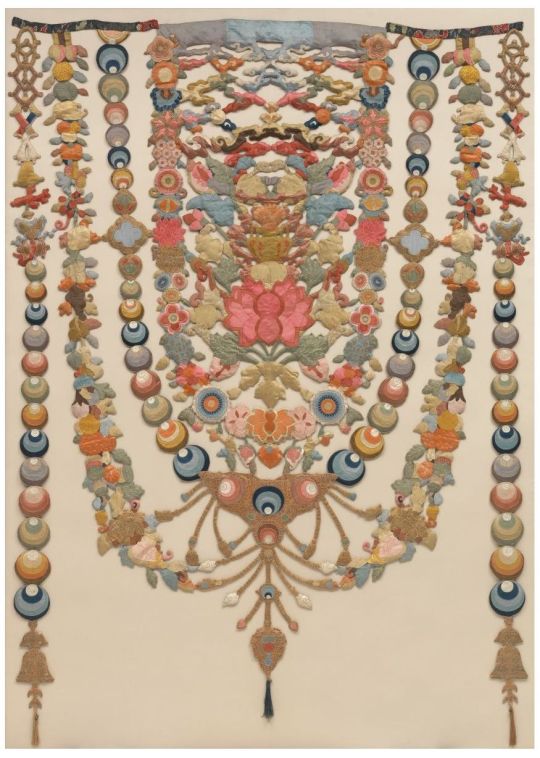
Tibetan Temple Hanging (unknown artist), early 20th century. Dyed and painted silk appliqué
The garlands that make up this complex textile contain hundreds of small quilted and embroidered silk elements—mostly emblems of abundance such as flowers, fruits, jewels, and treasures from the sea along with symbols considered auspicious by Tibetan Buddhists. The composition centers on a large blooming lotus supporting a brimming vase, both ancient Indian symbols of life. This hanging would once have enlivened the interior of a Buddhist temple or audience hall. While long, horizontal examples hung from ceiling beams are more common, this textile’s vertical shape suggests that it might have hung either in front of a large altar or above an entryway, rather like an ornamental festoon in western architecture.
180 notes
·
View notes
Photo
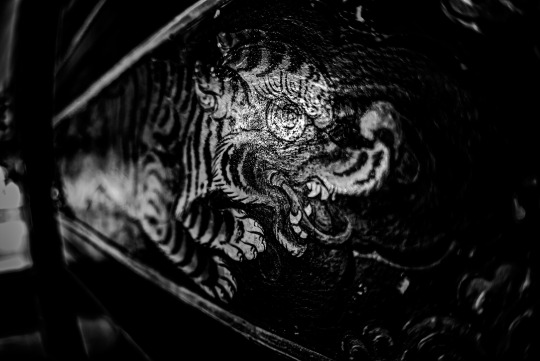
June 2011 KTM Kathmandu Nepal Road to Lumbini
© KOJI ARAKI Art Works
Daily life and every small thing is the gate to the universe :)
#2011#June 2011#ktm#kathmandu#nepal#Road to Lumbini#Lumbini#2nd day in Lumbini#the 2nd day#photographers on tumblr#b&w photography#black and white photography#original photography#photography#koji araki art works#tibetan buddhist temple#tibetan buddhist monastery#temple#monastery#buddhist painting#mural#tiger#PENTAX K10#SIGMA 15mm 2.8 EX Fisheye#Fisheye#SIGMA#PENTAX
28 notes
·
View notes